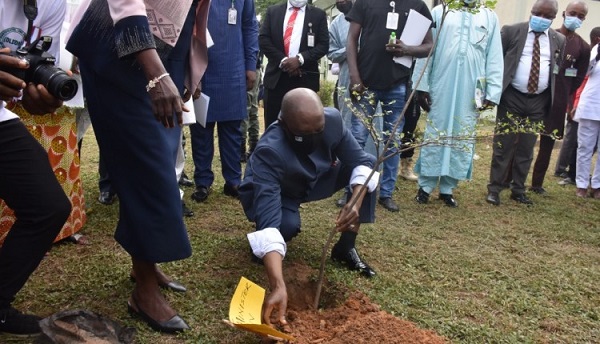As Nigeria joins the rest of the world to mark the World Desertification and Drought Day (WDDD) 2021, the Minister of Environment, Dr. Mohammad Mahmood, has said over 40 million people are affected by desertification in the 15 northern states of the country.

He stated this at an event organized by the ministry in collaboration with the Federal Capital Territory Administration (FCTA) to commemorate the WDDD observed globally every June 17, with the theme ‘Restoration. land. recovery – we build back better with healthy land’ today in Abuja.
“Nigeria is faced with rapid desert encroachment affecting about 15 northern most states from severe to moderate rate. It is worthy of note that these states affected by desertification have a population of over 40 million people and is home to over 95 per cent of livestock population in Nigeria and has played a major role in the production of food for domestic consumption and export crops,” he said.
The minister, however, pointed out that the federal government was not oblivious of the environmental issues and their impacts and was committed to addressing them to ensure sustainable development and livelihood of the people in the affected communities.
He explained that government had developed policies and plans and built institutional and legislative capacities to enhance effective and far-reaching actions to reduce the impacts of desertification and drought on the citizenry, adding government recognised the importance of partnership in tackling desertification and had facilitated the involvement of other actors, including the private sectors, NGOs as well as donor organisations. Many of the actors, according to him, include the Nigerian Environmental Study/Action Team, NEST and the Nigerian Conservation Foundation.
“At the regional level, the Great Green Wall program for instance, is an example of a regional program involving West African partners. This program which aims at providing long- term solutions to desertification, land degradation, drought, climate change and biodiversity loss within the West African sub-region adopts integrated sustainable land management, approach in its operation.
“Government is concerned about the disruption of ecological system caused by poor land use, population pressure and the devastating activities of insurgents in the north eastern part of the country with the dire consequences of land degradation, loss of lives and means of livelihood.
“To this end government has put in place the North East Development Commission to restore human dignity and bring succor to the people living in this area. Government is also committed to strengthening the Lake Chad Basin Commission and repositioning it for better service delivery to those who depend on the lake for their livelihood,” he added.
Earlier in his welcome address, the FCT Minister, Muhammad Bello, said the FCT administration had keyed into the Nigerian government’s efforts in the fight against desertification and drought.
“Here in the FCT, we have also keyed into the Federal Government’s efforts in the fight against desertification and drought as we have begun the process of planting about 170,000 trees across the FCT with the collaboration of several non-governmental organisations, and members of the public,” he said.
Muhammad represented by the director, office of the permanent secretary, Udoh Attah, said 70,000 of the tree seedlings planted by the FCT were received from the Federal Ministry of Environment last year and thanked them for the gesture.
In his remarks, the director-general, Nigerian Meteorological Agency (NiMet), Prof. Mansur Matazu, said rapid population growth in Nigeria, coupled with competition over dwindling common pool; land and water resources had further driven the conflicts in several states to the extent that some persons were ready to take up arms to assert their right of access.
Represented by the agency’s general manager, climate services, Idris Mohammed, Matazu said beyond weather forecasting, NiMet was in good position to provide wind and solar installation mapping to enable the deployment or renewable energy in form of wind and solar power.
“This will no doubt reduce the destruction of trees and vegetation for firewood and other forms of raw biomass and serve as valuable driver to restoring degraded land and helping in conserving Nigeria’s diverse natural ecosystem,” he added.
Earlier in his goodwill message, the United Nations Convention to Combat Desertification (UNCCD) correspondent on science and technology, Prof. Ifatimehin Olariwaju, urged government to sensitize, educate and carry the rural areas along in the celebration and commemoration of the day, saying they are the worst hit and mostly affected by the negative effects of climate change because of unsustainable/negative climate practices.


